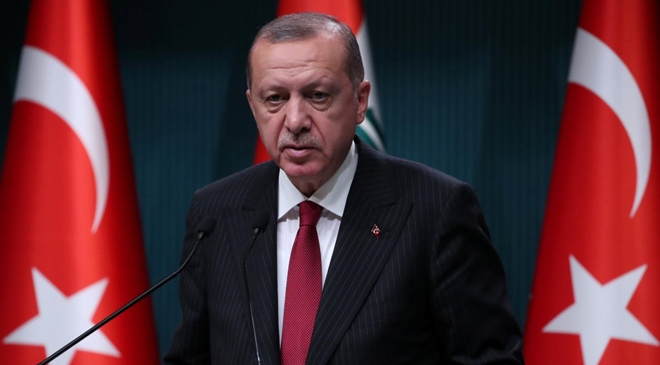Turkey doubles tariffs on some U.S. imports; lira rallies
- Turkey, U.S. relations can be saved, presidential spokesman says
- Turkey orders 13 detained for online opposition to Syria offensive
- Turkey says campaign against U.S.-backed Kurdish force in Syria will be swift
- Turkey says Trump must keep pledge on not arming YPG militia
- Turkey no longer needs EU membership but won't quit talks - Erdogan
 |
|
Turkish President Tayyip Erdogan attends a news conference in Ankara, Turkey, August 14, 2018. REUTERS/Umit Bektas |
Ankara acted amid increased tension between the two NATO allies over Turkey’s detention of a Christian American pastor and other diplomatic issues, which have helped send the lira tumbling to record lows against the dollar.
The currency has lost nearly 40 percent against the dollar this year, driven by worries over President Tayyip Erdogan's growing influence on the economy and his repeated calls for lower interest rates despite high inflation.
It rebounded some 6 percent on Wednesday, briefly strengthening to less than 6.0 against the dollar, after the central bank squeezed lira liquidity in the market, effectively pushing up rates and supporting the currency.
Optimism about better relations with the European Union after a Turkish court released two Greek soldiers pending trial and a banking watchdog’s step to limit foreign exchange swap transactions have also helped the lira.
“They are squeezing lira liquidity out of the system now and pushing interest rates higher,” said Cristian Maggio, head of emerging markets strategy at TD Securities.
“Rates have gone up by 10 percent ... The central bank has not done this through a change in the benchmark rates, but they are squeezing liquidity, so the result is the same,” Maggio said.
The lira had rebounded about 8 percent on Tuesday on news of a planned conference call on Thursday in which the finance minister will seek to reassure international investors. A Finance Ministry official said so far 3,000 people have signed up for the call.
Turkey’s banking sector remained strong and liquid and the measures taken to support the market have started to show impact, Turkey’s Akbank chief executive said and added there were was no withdrawal of deposits.
SPAT WITH U.S.
A decree signed by Erdogan doubled Turkish tariffs on passenger cars to 120 percent, on alcoholic drinks to 140 percent and on leaf tobacco to 60 percent. Tariffs were also doubled on goods such as cosmetics, rice and coal.
The duties were raised in response to the U.S. administration’s “deliberate attacks on our economy,” Vice President Fuat Oktay wrote on Twitter. Last Friday, U.S. President Donald Trump said he had authorised higher tariffs on aluminium and steel imports from Turkey.
The United States was the fourth largest source of imports to Turkey last year, accounting for $12 billion of imports, according to IMF statistics. Turkey’s exports to the United States last year amounted to $8.7 billion, making it Turkey’s fifth-largest export market.
NATO allies the United States and Turkey have been at loggerheads over a wide range of topics including diverging interests in Syria, Ankara’s ambition to buy Russian defence systems and Andrew Brunson, a pastor on trial in Turkey for terrorism charges.
Trump has repeatedly asked for Brunson’s release, while Ankara said the decision was up to the court. On Wednesday, a Turkish court in the Aegean province of Izmir, where Brunson is on trial, rejected the pastor’s appeal to be released from house arrest. An upper court had yet to rule on the appeal, his lawyer told Reuters.
Erdogan has said Turkey is the target of an economic war, and has made repeated calls for Turks to sell their dollars and euros to shore up the currency. On Tuesday, he said Turkey would boycott U.S. electronic products.
In another high-profile case, a Turkish court ruled on Wednesday to release from jail Taner Kilic, the local chair of Amnesty International, a researcher from the rights group said.

